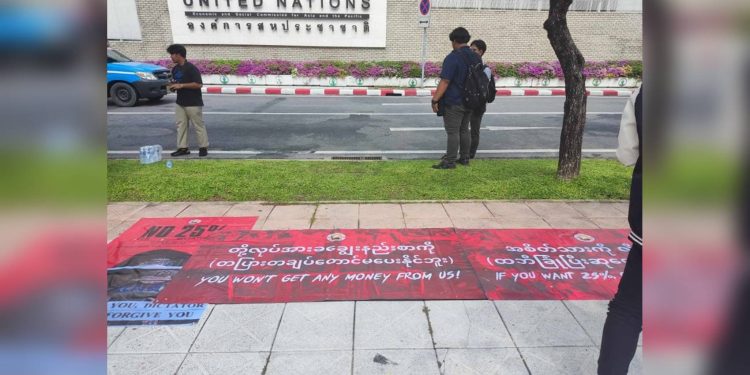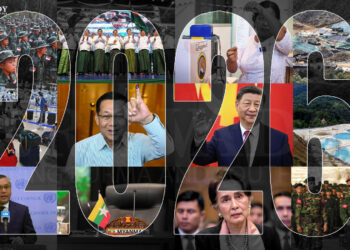The cash-strapped regime’s announcement to force Myanmar migrant workers to pay a tax of at least 10 percent on incomes earned in other countries is sparking a backlash in Thailand where as many as 5 million Myanmar migrants work.
They staged a protest outside the United Nations Office in Bangkok on Sunday against the junta’s plan to tax their salaries.
Ko Nay Lin Thu from the Aid Alliance Committee, a non-profit helping Myanmar migrant workers in Thailand, said: “Myanmar workers have to pay utility bills, rent, as well as work-permit costs, and life insurance premiums in Thailand. These are taxes. There are workers who can’t remit any money back home at the end of a month.”
The new income tax means they have to pay double tax, he said.
Earlier this month, the regime also introduced a new remittance rule, which took effect on September 1, demanding that Myanmar nationals working in foreign countries remit at least 25 percent of their foreign-currency income through the country’s banking system.
The remittances will be converted at the official exchange rate of 2,100 kyats per US dollar. The market rate is about 3,300 kyats. The junta’s reference exchange rate for the Thai baht is just 56 kyats, but the market rate is around 110 kyats per baht.
Migrant workers who do not comply will be barred from working overseas for three years after their current work permit expires, the announcement warned.
“Workers will have 25 percent of their hard-earned money converted at [the junta’s] rate, and also pay 10 percent of their income. Workers have to eat rice with only salt then. It is exploitation,” Ko Nay Lin Thu added.
Previous military regimes also levied income tax on Myanmar migrant workers, but it was repealed under Thein Sein’s quasi-civilian government.
At least 10 percent income tax will be levied on foreign-currency income of expatriate workers from October 1 to March 31 next year, according to an announcement signed by junta boss Min Aung Hlaing and published in junta newspapers.
U Aung Kyaw, spokesman of the Thai-based Labor Rights Foundation, said Myanmar workers, unlike in the past, have had no overtime because of the impact of the COVID-19 pandemic and the political situation in Thailand.
Many workers are scraping by on 300 baht (US$ 8.25) per day, he said.
Migrant workers from Myanmar “only earn 300 baht per day, but they have to pay large sums of money for work permits,” U Aung Kyaw said.
“They have to pay rent, water and electricity bills. Many workers are struggling to make ends meet, and they stay in Thailand only because they can’t return to Myanmar right now. The income tax is not fair,” he added.
Under the new taxation law, five percent of income tax is imposed on those who earn between five million and 10 million kyats per year, 10 percent on those who earn between 10 million and 20 million kyats, 15 percent on those who earn between 20 million and 30 million kyats, and 25 percent on those who earn more than 30 million kyats a year.
A migrant worker who earns 10 million kyats a year has to pay 500,000 kyats in income tax, and a migrant worker who earns 20 million kyats a year has to pay one million kyats in income tax.
“The regime is now in a tight corner, and is therefore trying to milk ordinary and poor families [for cash],” said U Aung Kyaw.
Myanmar migrant workers in Thailand who work under a memorandum of understanding between the two governments say the regime exploits them and ignores their suffering.
U Zaw, who has been working in Thailand for around 20 years, told The Irrawaddy: “The income tax is unfair. Many workers are in trouble, [but the regime] does not take care of them. They call themselves a government, but they do not help workers, and only exploit them. I have no intention to pay the income tax.”
It is estimated that there are as many as five million licensed and unlicensed Myanmar migrant workers in Thailand. About 400,000 licensed migrant workers have left Myanmar in the two years following the 2001 coup.

















